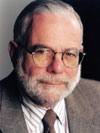| Home | Blog | Ask This | Showcase | Commentary | Comments | About Us | Contributors | Contact Us |

A columnist's sleight of handCOMMENTARY | October 304, 2008David Brooks is very bright, Morton Mintz and George Lardner, Jr., seem to agree. So why does he resort to poppycock to promote anti-government positions? By Morton Mintz and George Lardner, Jr. New York Times columnist David Brooks is impressive by most measures—intellect, range, research, insight, prose. But does he sometimes use that impressiveness to anesthetize his readers so that he can then stealthily inject them with a dose of Alan Greenspan, Neocon, and/or Republican ideology? His Oct. 28 column provides the latest reason to wonder. Look at the sleight-of-hand nonsense in the sentence we've underlined in the column's penultimate paragraph:
In the financial crisis, some—but not all—Democratic and Republican government officials and regulators, most notably Greenspan, certainly did flunk as "perceivers of reality." But were they "even worse perceivers of reality than private business types" who, say, created the housing bubble? More broadly, who are these "government officials" he's talking about? The current and former officials of the Federal Reserve who had warned Greenspan about, among other things, the need to regulate hedge funds and mortgage-based securities? The Food and Drug Administration medical officer who prevented the marketing of thalidomide, which caused infants to be born without arms, legs, or any limbs at all? In short, the careerists who try to do the regulating, or the political appointees who keep their ears sharply attuned to the private interests that Brooks is describing as more in touch with (their own) reality. And talk about understatement: e.g., the markets are not "perfectly efficient." What kind of efficiency, for example, pays zillions to business leaders after they've presided over steep losses in profitability, or to Wall Streeters who've decimated countless 401ks and concocted the disastrous credit-default swaps? The column ignores a wider "reality," of which the drug industry provides but one example. Pharmaceutical manufacturers have doubtless given us all much to be thankful for. But they have always demonstrated, and regularly continue to demonstrate, that they will do almost anything, however immoral, to sell medicines, such as consistently lying about safety and efficacy even after knowing that doing so needlessly kills and harms people, corrupting physicians, not doing tests that needed to be done, suppressing adverse test results, and on and on. It was this reality (and the similar reality of the meat-packing industry exposed by Upton Sinclair, in "The Jungle") that led to enactment of the first food and drug law. To defeat and thwart effective regulation, the drug industry—efficiently—buys politicians, employing, in the process, more Washington lobbyists than the 535 members of the House and Senate, and invests heavily in front groups (the Chamber of Commerce of the United States, e.g.) and think-tanks (such as the Competitive Enterprise Institute). Ditto, say, for mining companies and other employers that, unregulated, did not, and, unless forced to do so, will not provide safe working places. So if properly overseen by a president, Congress and press doing their jobs, why, exactly, are "government officials...probably...even worse perceivers of reality than private business types"? Brooks has ample opportunity to tell us, as did the late economist Milton Friedman, a Nobel Laureate but also an ideologue. He once went so far as to urge abolition of the FDA. The late Senator Gaylord Nelson, who held hearings for a decade (1967-1977) on the drug industry and FDA regulation, invited him to testify about his recommendation. Friedman pleaded other engagements. A reality of dubious reality.
|




